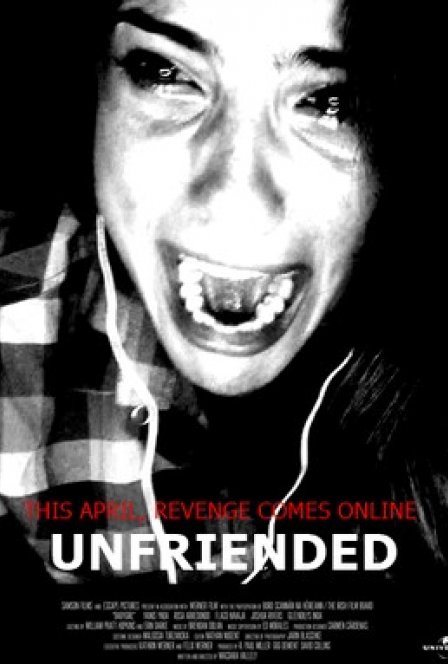How do you make vapid, clichéd, rigorously uninteresting characters somehow worth paying attention to? The answer, for most teen horror movies, is to seduce us with the lingering threat that these characters might die in a memorable and grotesque fashion, or perhaps even have sex and then immediately meet their bloody end. Unfriended, Levan Gabriadze’s concurrently inane and brilliant revenge-of-the-cyberbullied film, only briefly teases us with the lure of sex, as virginal couple Blair (Shelley Hennig) and Mitch (Moses Storm) tempt each other over Skype before being barnstormed into a group video chat. Joining them are the standard array of high school archetypes: the fat nerd Ken (Jacob Wysocki), the loutish hothead Adam (Will Peltz), and Jess (Renee Olstead), the slut coded with too much eye makeup. A final guest is uninvited, and is either a uniquely skilled cyberbully or the ghost of former classmate Laura Barns (Heather Sossaman), who committed suicide a year ago amid the fallout from a particularly embarrassing cell phone video gone viral. The film quickly devolves into formula: the teens playfully deny that they’re characters in a horror film, until they start getting picked off one by one. Much bickering and panicking ensues, leavened by the occasional and somewhat clever burst of gore.
Unfriended both embraces and transcends its familiarity through sheer commitment to its aesthetic and topical conceits. Gabriadze and writer Nelson Greaves portray the film’s cyberbullying backstory with striking verisimilitude, but Unfriended seems truly innovative in how naturally and gracefully it handles its gimmicky framing device. Most of the film seems to elapse in one extended shot, and its frame is the screen of Blair’s MacBook: she opens Spotify as she flirts with Mitch over Skype, but we can almost always glance at bookmarks and open tabs on the web browser behind the Skype app, as well as the cryptically-titled JPEGs and Word documents cluttered on Blair’s desktop. Gabriadze uses this sequence to familiarize us with the film’s unique mise-en-scene; once the terrorizing begins in earnest, Blair’s use of multiple programs and browser tabs becomes increasingly dextrous. Her terrorizer becomes equally adept, juking search results stats and inciting some cyberbullying and virtual mobs of its own.
The best thing about the film is how intuitive all of Blair’s habits seem: Unfriended only seems new or experimental if you pause to think about it, realizing you’ve spent the past minute observing a character fret over how to phrase Facebook message. (The tiny audience I saw the film with on a Tuesday afternoon began to converse loudly during moments like this, which seemed strangely acceptable, not only because Blair is a milquetoast protagonist but because Unfriended kind of embodies how fully private interactions have infiltrated social spaces.) Hennig, viewed only in video chat, gives a bland performance, but the film’s framing device elevates her character, as we get to watch her delicately freak out to her boyfriend over iMessage while playing amateur web sleuth as she also delicately interacts with the disembodied ghost of her dead friend. Every deleted or edited sentence adds an additional shade to her character, and also gets across the ubiquitous struggle and imperative to project a strong yet amiable web persona. Meanwhile, Mitch embodies both the aloof boyfriend and the vagaries of our behavior over text and internet exchanges: the sudden disappearances that seem to signify that you’re an unimportant or uninteresting chatting partner, the aloofness that might either indicate someone’s disinterest or their simple blandness.
Gabriadze does an impressive job juggling both a horror narrative and a bevy of familiar social practices and anxieties. Web outages and short circuits disrupt his prolonged shots once in a while, but the director is beautifully attentive to his frames. Unfriended always seems to be guiding our eye and allowing it to wander at the same time, leaving us in the state of slight distraction we go to the movies to try to escape.

